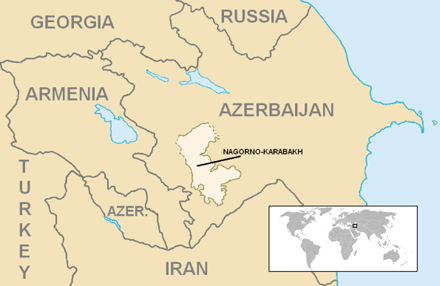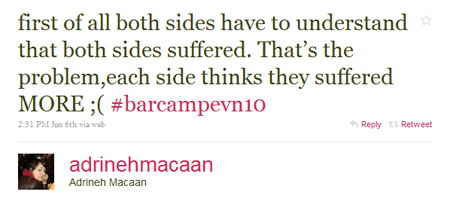This post is part of our special coverage Caucasus Conflict Voices [1].

As Global Voices looks back at the success [2] of Rising Voices grantee Ceasefire Liberia, a citizen media site dealing with conflict and reconciliation, new activity in the same area is starting to be noticed in the Caucasus.
In part, this has also been thanks to coverage of the potential role [3] new and social media can play in this area by Global Voices. Certainly, it directly facilitated communication and cooperation between bloggers and activists, some of whom are now involved with NGOs working in this area as a result, on both sides of the ceasefire line separating estranged neighbors Armenia and Azerbaijan.
Since then, new and existing projects working towards establishing dialogue and peace in the region are starting to use new and social media [4] in their activities. This possibility was also discussed in a podcast interview [5] with the American University's Micael Bogar last year alongside coverage of other projects in the same area [6] such as PH International's DOTCOM and one by Global Voices’ Caucasus regional editor [7], as an Azerbaijani blog, Flying Carpets and Broken Pipelines, explained in January [8].
This could be a real push in building dialog between the two countries and their people not to mention perhaps a beginning of strong ties. These trips show that coexistence is possible and its only a matter of effort and will to make such collaboration and coexistence happen. Maybe it is time stop using NK conflict as a bargaining chip and stall growing enmity between the two people, replacing it with more initiatives as such.
Oxfam also commented on the coverage [9] initiated by Global Voices on its blog.
The bitter conflict over the Nagorno-Karabakh region continues to plague the Caucasus. While negotiations have intensified over the past year, relations remain tense on the frontline and the future of this territory is unclear. […] While Oxfam does not currently operate in Nagorno Karabakh because of sensitivities, perhaps in the future social media will help to open up new communication channels and, ultimately, bolster development in the region as a whole. In the long run social media could even play a role in an eventual resolution of the conflict.
Even if civil society has only taken its first infant steps into the world of social media in the Caucasus […]
As a result, the open communication to be found online is unprecedented in recent years albeit, as Oxfam pointed out, still in its early stages. For example, Caucasus Edition, a recently launched online academic journal which also features a blogs section directly tackles the conflict between Armenia and Azerbaijan over the disputed territory of Nagorno Karabakh. In one post Efgan Niftiyev explains why resolution of the conflict put on hold by a 1994 ceasefire, but by no means settled, matters [10].
The August 2008 war in Georgia showed how dangerous and fatal frozen conflicts could become in just a few days. The outcome of the five-day war between Russia and Georgia made it necessary for the international community to pay more attention to the frozen conflicts in the South Caucasus. […]
[…]
Increased efforts from international actors also show reasonable understanding that without solving the Nagorno-Karabakh conflict, there is no other way to achieve cooperation and stability in the South Caucasus. […]
[…]
If there is continued lack of real progress, it will be quite possible to see another bloody war in the South Caucasus. […] Azerbaijan may soon see war as the only solution to the problem given the recent statements by Azerbaijani officials. Another war in the region can lead to catastrophe and unavoidable results for the people of the region, since they are the ones who actually suffered (both Azerbaijanis and Armenians) for years from animosity. Thus, the international community and the leaderships of the conflicting states need to take the initiative before things get to the point of military engagement, as was the case in Georgia.
Writing on the same site, Afa Alizada, however, says that the current environment is not conducive [11] to finding a still elusive lasting peace.
[…] if there is a breakthrough it will be a result of substantial compromise from both parties. Whatever an agreement is reached on the paper behind the closed doors, however, will be impossible to implement if the Armenian and Azerbaijani people’s expectations are too high and do not reflect the realities of what a peaceful resolution can achieve. […] In the meantime, the leadership in both countries should move away from the belligerent rhetoric and facilitate people-to-people contacts between Armenians and Azerbaijanis in an effort to prepare them for potentially uncomfortable concessions.
Arzu Geybullayeva, who was interviewed by Global Voices [12] nearly a year ago and is now an Associate Editor for the site, concludes that dialogue is therefore necessary [13].
We often tend to overlook the importance of this word — dialogue. In day-to-day life, we actually use it all the time when we speak to our parents, siblings, friends, neighbors or colleagues at work.
[…]
Now, let us move […] into a more complicated “post- conflict” context, where […] we have civilians, from two conflicting sides, with little or almost no dialogue. With such a situation persisting, it is unlikely for any peaceful prospects for both sides.
To me, this is how it has been in case with Armenia and Azerbaijan, the two countries that know very little of one another and whose people are engaged in very little dialogue.
New & Social Media in Armenia-Azerbaijan Conflict Transformation [14]
Coincidentally, the same point was not lost on a blogger living in Armenia after attending this weekend's Barcamp and a presentation given by Global Voices on the use of social media in conflict transformation in Yerevan, the capital. Indeed, Le Retour (in 3 Parts) notes, ingrained attitudes to the dispute are not helping [17].
[…] during question and answer period, a couple of individuals stated that Azerbaijan should be the first to take a step (toward conflict resolution) and that it’s worse “over there” and what about all those lies the Azerbaijani media publish about Armenia? And with the snap of your fingers, we were once again confronted with age-old beliefs about the enemy and the “us vs. them” mentality.
[…] These type of statements are road blocks: they don’t move the conversation forward, they only lead to dead ends.
[…]
I think it’s all about the grassroots level. It starts here. It starts now. With us. We don’t wait for governments, nor should I say NGOs. We start with each of us. Though I believe we should address the nationalism that’s touted by the media and by the state, I don’t think that’s where change happens or where we should start from. We start with you and I. […]
The blogger also live-tweeted points and comments from the presentation.

At the same time, however, Global Voices also pointed out that the online discussion now taking place might also run the risk of unwanted attention and action from official circles concerned by it. In April, for example, one Azerbaijani blogger was harassed [18] by a group of others from her country after co-presenting with Global Voices’ Caucasus regional editor. Since then, news reports [19] already suggest that attempts to control the situation through legislation are now afoot, and especially given increased activity [20] in the area of online activism in Azerbaijan.
Although perhaps more linked to internal political dissent as Azerbaijan prepares for a parliamentary election later this year, and with two video blogging activists currently in jail [21], the potential risks facing alternative voices to be found online are very real indeed. Nevertheless, In Mutatione Fortitudo, takes a more humorous look [22] at related news that official Baku might well be seeking to enlist the support of pro-government youth to combat the emergence of different opinions on blogs and social networks.
Back on Caucasus Edition, Anahit Shirinyan, the Armenia coordinator for the organization responsible for the site, however links the two, considering that the situation in terms of conflict suits those opposed to the idea of democracy [23] at home.
[…] Throughout almost two decades the authorities in Armenia and Azerbaijan have been successfully using this method to distract people’s attention from serious internal problems to the enemy out there. Anti-Armenian and anti-Azerbaijani rhetoric has very often kept people silent on human rights and democracy issues at home. […]
With new and social media now firmly in the attention of the authorities in Baku and, since the bitterly disputed presidential election in 2008, in Yerevan, it remains to be seen whether concerns over possible new restrictions on online activity are imposed. And, if they are, such a move will be a telling indicator of the state of democratic development and efforts to resolve conflict in both countries. In the meantime, the Eurasia Partnership Foundation will soon include monitoring of bias in online coverage [24] of the conflict.
The Goal of the Project is to contribute to accurate and unbiased reporting of the bilateral relationship between Armenia and Azerbaijan and the Nagorno-Karabakh conflict, especially in the online media and blogosphere; to establish a cooperative network of citizen journalists, bloggers and other media professionals from Armenia and Azerbaijan.
This post is part of our special coverage Caucasus Conflict Voices [1].